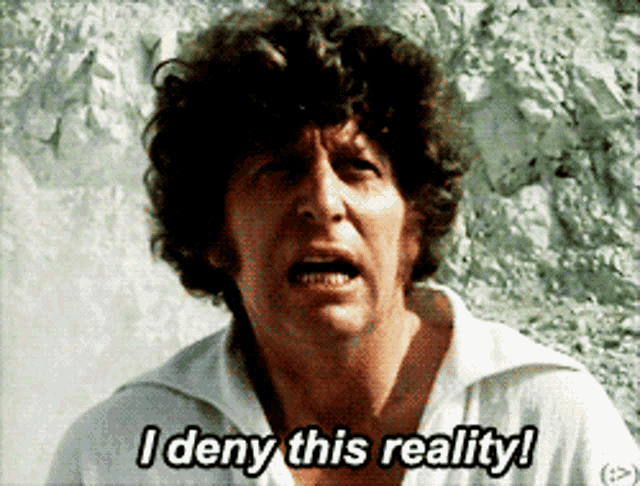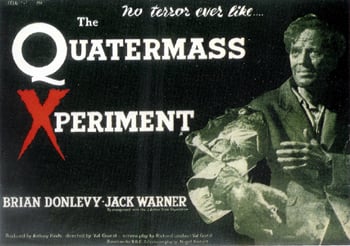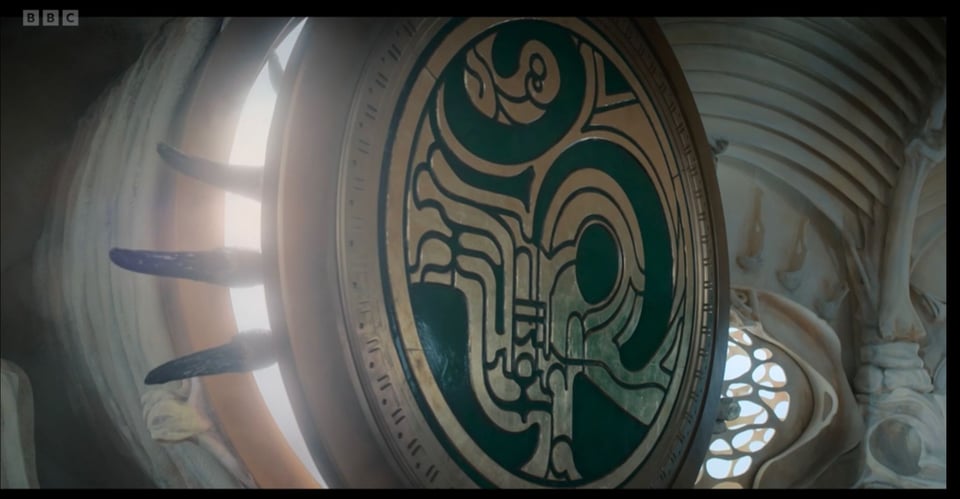"Memories are made of this."
“A man is the sum of his memories, you know. A Time Lord even more so.”
But not my memories. The second of our short series of pieces about the most recent Doctor Who series is a guest post by Dale Smith, whose Black Archive volumes on Silence in the Library and The Greatest Show in the Galaxy can be found here and here. Take it away, Dale! The floor of the Psychic Circus, er, Paper, is yours. - J
It is May, 2025, and I am sitting in a small arts space cunningly tucked under the arches of the Manchester Metrolink to Salford. To my right is one friend I have seen recently, to my left another I haven’t seen since university. He arrived late and we don’t spot each other, and won’t know that we were both there until the next day when we exchange apologetic emails. On the stage, Toby Hadoke is telling us how a fly may be responsible for the fact that only two episodes of The Quatermass Experiment were recorded for posterity, the remaining four disappearing into the ether the moment they were broadcast live. I remember Toby as the young student our mutual friends at University delighted in telling me was also into Doctor Who.
“Do you think you like Quatermass so much because it doesn’t exist?” someone in the audience asks.
Toby considers, and talks about the allure of trying to uncover the facts about an event that only exists in people’s flawed memories. Sifting through the recollections and false memories, collating, curating, surmising to uncover the probable. He agrees that yes, similar to Doctor Who’s own missing episodes but different since all of those did at least exist at one point, probably the impossibility of ever seeing the episodes with his own eyes is a large part of the appeal.

It is 1992, and I am watching The Tomb of the Cybermen, a miracle in VHS format. Doctor Who - A Celebration assured me this was a classic of the Troughton era, lost forever to the cruel hands of BBC policy. Jeremy Bentham’s recollections of viewing this on broadcast are fresh in my mind, and the rest of fandom’s. As I watch though, the excitement starts to fade. This isn’t a lost classic: it’s a fairly standard base under siege story that doesn’t quite grab me as much as The Seeds of Death, possibly because if the Doctor had left well-enough alone the story would never have happened. Bentham has misremembered, and the story’s reputation drops like a stone.
It is 2024 and Russell T Davies has gifted fans the entirety of extant Doctor Who (bar one notable exception) on the iPlayer. I am watching Kinda, because I remember the cliffhanger where Sanders opens the Box of Janna and screams as the light hits his face, so well that it still terrified me when I read the novelisation in 1984. Only when that scene arrives, it isn’t a cliffhanger and Sanders doesn’t scream. That moment has informed my idea of Doctor Who cliffhangers for 40 years, inspired me to try and recreate it in text more than once, and it doesn’t exist. Not as I remember it, anyway. I watched the VHS when it came out in 1994, but that false memory survived the experience. It survives even now, though it definitely never happened.
It’s 2023. James Cooray Smith has a newsletter, where he mines his encounters with Doctor Who, in order. Amongst other things. One man’s remembrances, although it will ironically be a couple of years before he hits Remembrance. This should be good, I think to myself. I sign up.
It is 1991 and I am watching the VHS of The Three Doctors. I am not a Pertwee fan, and the gel guards are frankly ridiculous. Poor William Hartnell barely has anything to do, but Patrick Troughton is having a ball. Pertwee stands, all aristocratic bouffant, telling Omega his own history, how he accidentally fell into a Black Hole some way from Gallifrey and somehow ended up as anti-matter, but has been revered as a lost hero by Time Lord society. By the Doctor himself. Omega takes his helmet off and reveals CSO. Typical. Can’t have Pertwee without dodgy CSO. I only bought this because I’m a completist anyway.
It is still 1991, and I am watching The Deadly Assassin on VHS. To me, Tom is overrated, but this is a good one. I was born during the transmission of this one, and I remember that Doctor Who fandom was too. Not the fan club, but fandom as we think of it: the fans who seem to like Doctor Who so long as it’s over 10 years old. Jan Vincent-Rudzki decried that the show had completely done over the Time Lords, rewriting established facts about their history. What has happened to the magic of Doctor Who? He was wrong, of course: he thought the story contradicted the things he’d seen in The War Games, but it fits quite well, really. He’d misremembered. Of course, he was right as well though: the story should have been about Omega, the Time Lord who invented time travel. But Bob Holmes invented Rassilon, and years later Ben Aaronovitch would have to invent the Triumvirate to explain all the confusion.
Maybe Holmes forgot.

It is 2024, and I am watching The Three Doctors on the iPlayer. I am a huge Pertwee fan, and the gel guards aren’t as bad as I remember them. They couldn’t have done it without Hartnell and it’s fitting they got him in however they could. Patrick Troughton isn’t really playing his Doctor, but he’s still having a ball. Pertwee stands and tells Omega his own history, before the first Time Lord removes his helmet and reveals his body is completely gone. I’m so glad I have this to watch whenever I want.
It is 25th May 2025, and I am watching a YouTube clip released by the BBC. Omega has just been a surprise addition to the cliffhanger of Wish World, and they are obviously trying to bring as many viewers up to speed as they can. Pertwee stands, all aristocratic bouffant, telling Omega his own history. I wonder how they will tie everything up next week?
It is 31st May 2025, and I’m watching The Reality War. The Doctor gives a description of Omega that flatly contradicts Pertwee’s description him as a revered hero of the Time Lords, and later a CGI monster emerges from the underworld. The Doctor explains that he has bought into his own legend, become the mad god, the titan. The phrase bothers me, until I remember the MCU’s Thanos is also known as the Mad Titan. He’s done it again, that RTD: I remember last year he reintroduced Sutekh, and completely changed his appearance and character too. They were both good Who villain ideas - the God of Death and the Mad Time Lord Titan - but what’s the point of bringing back old monsters if you don’t stay true to the established facts? There must be one.
Yes, in the old days you could assume only the rabid fans would remember this stuff, but the BBC is trying to make us all fans now. It’s on the iPlayer. They clipped the very bit this contradicts on YouTube just last week.
It’s May, 2025 and I’m listening to Toby talk about the ending of Quatermass as scripted and presumably broadcast. The alien creature growing in Westminster Abbey. I think about how many people had been inspired to create things I love by their memories or other people’s memories of watching that moment on television nearly 80 years ago. Grant Morrison, having the same climax in an issue of their Invisibles comic. Mark Gatiss writing Nightshade, still my favourite of his books. How many people misremembered Quatermass, or focussed on the wrong bit of it because their memory told them it was significant? How many of them turned that into something else, something brilliant?
Or maybe they just copied the Hammer movies: they all still exist. They had them on the iPlayer a bit ago.

It’s 1991 and I’m watching The Deadly Assassin on VHS. This is what the Time Lords I remember are. The Pertwee ones, The War Games ones, they were a bit … bland. But these are Machiavellian, bureaucratic nightmares: you can see both how their society functions and why the Doctor would leave it. And all because this was an era before these very VHSes and Holmes had either forgotten or assumed the audience had forgotten all the other versions of them. I recall Terrance Dicks - was it Terrance Dicks? - saying continuity was what the audience remembered. The Daleks were tin-plated Nazis, not static-powered mutants dying alone refusing to believe in the possibility of alien life. Time Lords were Oxbridge colleges, all competing for kudos, not dispassionate gods immortal barring accidents, regenerating ad-infinitum, off into the future.
How different would Doctor Who be if you couldn’t rely on the audience’s ability to forget? If it ossified into stone facts that meant you always had to create anew, never reinvent the similar to fit your current purposes?
That wouldn’t happen, though. Only old fans remember stuff like this.
Everyone else forgets.
